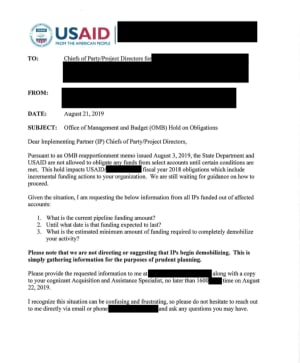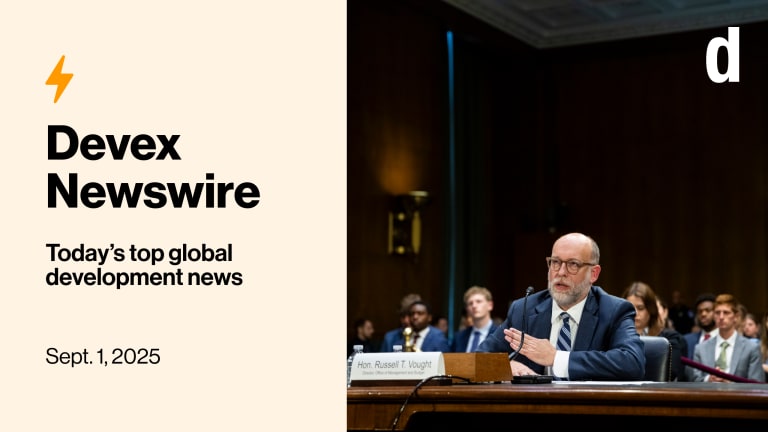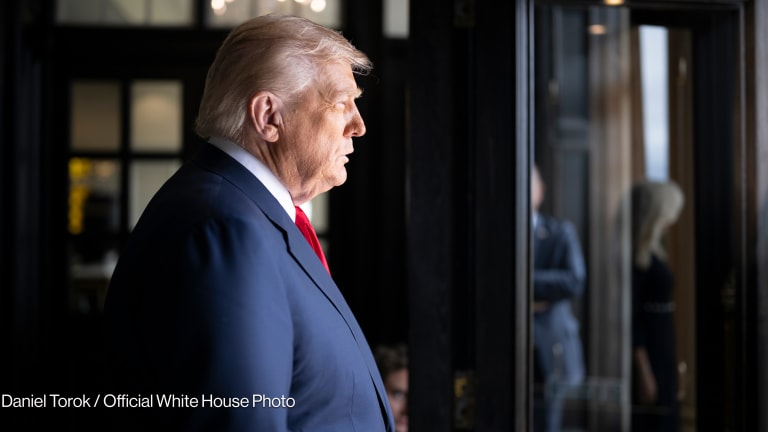
WASHINGTON — For the second year in a row, the White House has abandoned a plan to rescind billions of dollars in foreign aid funding.
While reports had trickled in all week suggesting President Donald Trump might reconsider the rescission package — expected to target more than $4 billion of foreign aid money already appropriated by Congress — on Thursday sources with knowledge of the president’s decision informed Devex the plan was no longer on the table.
Multiple aid advocacy groups quickly released statements applauding the decision and crediting Secretary of State Mike Pompeo, in particular, with intervening on behalf of U.S. development programs.
“This is the right ending to a charade that should have never happened.”
— Tom Hart, North America executive director at ONE CampaignAccording to one source with knowledge of the situation, the decision came during a morning White House meeting that included Trump, Treasury Secretary Steven Mnuchin, Chief of Staff Mick Mulvaney, and Office of Management and Budget Acting Director Russell Vought, with Pompeo calling in from Ottawa. Pompeo and Mnuchin argued against the rescission, while Mulvaney and Vought pushed for it, Devex learned.
While the rescission will not go forward, multiple sources believed that Trump’s decision likely includes some kind of effort to reprogram funding away from specific U.S. Agency for International Development programs — including in Guatemala, Honduras, Pakistan, and West Bank-Gaza.
Catch up
► US NGOs decide to forego legal action against Trump administration — for now
► US aid advocates brace for 'rescission' battle
► Trump administration resurrects 'rescission' proposal in latest attack on US aid spending
While early reports suggested all three countries of Central America’s Northern Triangle would likely see cuts, the sources informed Devex that funding for El Salvador might continue, though specific details are still emerging.
One source believed the White House planned to continue to impose a 2% daily spending cap on unobligated foreign aid funding until the end of the fiscal year on Sept. 30.
Others questioned the negative effects the rescission plans — and associated funding freezes and restrictions — might have had on U.S. development programs, even if they never came to full fruition.
“I'm concerned about the impact the rescission exercise had on our programs and will continue to look into this in my role as Chairman of the Oversight and Investigations Subcommittee of [the House Foreign Affairs Committee],” Rep. Ami Bera, a Democrat from California, wrote on Twitter.
Last week most people with knowledge of the situation believed the rescission plan would move forward this year. This week, reports emerged that Pompeo had made inroads with Trump in his effort to convince the president not to propose a rescission.
While the winds appeared to be shifting in favor of maintaining U.S. aid funds — or at least dramatically scaling back the original plan — USAID as recently as Aug. 21, was still waiting for guidance from the White House.
In the absence of a definitive decision, at least one USAID official requested information from an implementing partner about how much funding would be required to “demobilize” their program. In the document, which Devex obtained, the identities of the official, the implementing partner, and the country where the program is operating were all redacted.
“Please note that we are not directing or suggesting that [implementing partners] begin demobilizing. This is simply gathering information for the purposes of prudent planning,” the message reads.

Asked about the rescission on Tuesday, Trump told reporters that there were still, “some things that are on the table very much.”
As word of the decision spread throughout the U.S. development community, aid advocates took a moment for cautious celebration.
"After weeks of internal deliberations, smart policy has clearly won the day,” said Liz Schrayer, president and CEO of the U.S. Global Leadership Coalition, in a statement.
“This is the right ending to a charade that should have never happened,” said Tom Hart, North America executive director at ONE Campaign.








